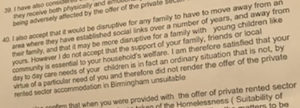Fact: Universal Credit is NOT the only benefit which plunges people into debt and desperation.
The entire benefit system is a wreck. Years of staff cuts, privatisation, jobcentre closures, sanctions, benefit delays and a brutal institutional contempt for claimants have left people reeling in a system that can’t even do the basics.
Universal Credit hasn’t gone wrong. It has gone exactly as planned. The application process is difficult. It excludes anyone who can’t use a PC, or navigate complex public sector bureaucracies. It has built-in delays which leave people in debt – rent arrears, in particular. Universal Credit strikes terror into anyone who might need it. Its depravity is entirely in keeping with welfare reform.
I understand why activists target Universal Credit. Universal Credit is a vicious ideological project which will adversely affect millions of working people (potential voters, that is). It has cost billions and will cost more. Its failures can be laid firmly at the door of Tory extremism.
The truth is, though, that every part of the safety net is in shreds. No politician will fix that easily. I’m not convinced that the electorate even wants the net fixed for a lot of people. Chaminda had that right. Destruction of welfare reflects an electorate view of the poorest. I’ve often spoken with people who are struggling mightily, but who agree with some degree of welfare reform. They receive benefits, but say that too many people get benefits when they shouldn’t.
——
Computer Says No
Let’s take a look at a few typical experiences of people who sign on (or try to) at Stockport jobcentre. I attend Stockport United Against Austerity leafleting sessions at that jobcentre and interview people as they come out. Universal Credit rollout starts at Stockport this month. The jobcentre already has some UC claimants.
The interviews below were all made this year. I’ve picked three at random. Readers of this site will know that I have many others.
The theme of these interviews? – Exclusion. Each person went into the jobcentre with an issue and came out with the same issue. Nothing was fixed, or solved. People were no closer to answers to problems than they were when they went in. This is so commonplace that it is standard.
Here’s Kerry:
Kerry was in her 30s. She was out of work. She was trying to sign on for jobseekers’ allowance while she looked for work. Kerry Anne had a job interview set for the Tuesday after we met.
Kerry had filled in a JSA application form. Then, she’d received a DWP text which instructed her to attend a meeting at Stockport jobcentre to complete her JSA claim.
Kerry had turned up to the meeting – only to be told that her paperwork wasn’t adequate. An adviser told Kerry she needed three forms of ID to claim JSA. The meeting ended there.
When I met Kerry, she was standing outside the jobcentre trying to guess what the adviser was on about. Kerry didn’t have three forms of ID. Nobody does. The adviser had not explained what she’d meant.
Upshot: Kerry left the jobcentre no closer to JSA than she’d been when she arrived. She had no idea how to complete her application and no idea when – or even if – she’d get any money.
That sort of scenario is absolutely par for the course. One person after another leaves that jobcentre trying to work out what in hell to do next. There really are times when it feels as though people who try to claim benefits are forced participants in a hellish gameshow challenge – where the prize for navigating one obstacle is a cryptic hint about the next one. The thing is ridiculous. It goes on and on.
Next up: a man in his 30s called Steve.
Steve needed help to buy a cheap pram. Steve and his partner had a baby, but they couldn’t afford a pram for him. Without a pram, they just carried the baby around town.
On the day we met, the couple had asked the jobcentre for a social fund loan. The jobcentre said they couldn’t have one. Advisers said Steve was paying back another loan. Steve insisted that he wasn’t. This went on for a while. The jobcentre wouldn’t budge.




